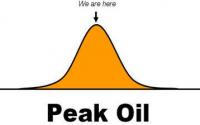2 May 2006
What Exactly IS Energy Descent?
 The term ‘energy descent’ is being used more and more to describe the period beyond the peak in world oil production. The concept is simple enough, the upwards left-hand side of the Hubbert curve we might call ‘energy ascent’, where each year there is more and more oil and gas available. Beyond the peak we can call it ‘energy descent’, where there is less and less available each year. For the paper I am writing at the moment I am looking to define what this much flung-about term actually means. I am attempting to draft a definition, and I would very much welcome your thoughts and input.
The term ‘energy descent’ is being used more and more to describe the period beyond the peak in world oil production. The concept is simple enough, the upwards left-hand side of the Hubbert curve we might call ‘energy ascent’, where each year there is more and more oil and gas available. Beyond the peak we can call it ‘energy descent’, where there is less and less available each year. For the paper I am writing at the moment I am looking to define what this much flung-about term actually means. I am attempting to draft a definition, and I would very much welcome your thoughts and input.
 The initiators of the concept (although I have yet to find anywhere where he uses the actual term) were Howard T. Odum and his wife Elisabeth C. Odum who wrote “that the way down can be prosperous is the exciting viewpoint whose time has come. Descent is a new frontier to approach with zeal … if everyone understands the necessity of the whole society adapting to less, then society can pull together with a common mission to select what is essential. Presidents, governors, and local leaders can explain the problem and lead society in a shared mission. Millions of people the world over, if they see the opportunity, can be united in the common quest for a prosperous way down. The alternative is a world of selfish battles for whatever resources remain
The initiators of the concept (although I have yet to find anywhere where he uses the actual term) were Howard T. Odum and his wife Elisabeth C. Odum who wrote “that the way down can be prosperous is the exciting viewpoint whose time has come. Descent is a new frontier to approach with zeal … if everyone understands the necessity of the whole society adapting to less, then society can pull together with a common mission to select what is essential. Presidents, governors, and local leaders can explain the problem and lead society in a shared mission. Millions of people the world over, if they see the opportunity, can be united in the common quest for a prosperous way down. The alternative is a world of selfish battles for whatever resources remain
Mark
3 May 4:54pm
i’m not sure if mirrors is the correct term. This would presume the bell curve is correct and unalterable. I have seen the bell curve applied to oil production, but have we an example of such a curve for ‘net energy’. Firstly i think we need to be clear about ‘net energy’, are we talking about just hydrocarbons? energy is an all encompassing (nuclear, solar, hydro…)
Joanne Poyourow
4 May 5:16am
I’d say:
‘Energy descent’ describes the process of departing from our culture’s current energy-intensive processes: copious transportation (ground, air, water); energy-intensive technologies; fossil-sourced-chemical intensive agriculture & medicine; and the business & political models dependent thereon.
I like the 2nd & 3rd sentences of your definition (“It also refers to a future scenario…”) and the final sentence of Adam Fenderson’s (“It is a term favoured by…”).
I do not agree with the phrase “continual decline” in yours. That implies a constant rate of change. The models of Robert Prechter and the Elliott Wave theory (based on Fibonacci) indicate that the descent will come in pulses or waves.
Also, your use of the phrase “fossil fuel” in the latter portions of your definition, and Fenderson’s “global fossil fuel extraction” might be broadened. I believe nuclear should be included within the umbrella of energy from which we are descending. Mark’s comment about “net energy” is a good one – even as we transition to renewable sources, part of that is a patch or a replacement for the high level of energy use to which we are accustomed. As we get further into Holmgren’s 500 years, we won’t be needing even the amount of renewables.
I explained this briefly in my book: “As we move from a fossil-dependent world into this array of renewable sources, and simultaneously move into a lifestyle oriented toward Sustainability, we will in fact be using less energy. Sustainable practices have their own energy. In the long term, for example, rather than fossil fuels to power trash trucks, very little in the way of outside energy input is needed for on-site and local composting, rebuy and reuse.”
Borrowing a phrase from Patrick Whitefield I’d add the following concept: Energy descent will likely mean transition to social, economic & political systems modeled very closely on ecosystems.
Joanne Poyourow
Los Angeles
Mark
4 May 5:28pm
perhaps the term ‘net energy’ is difficult to define. Energy can not be created, only converted. So are we talking about the amount of energy we are converting from our eco-system to another human-system. For example, if i heat a forge with coal and use that energy to make a sword, is the net energy i have used then the amount converted to molecular structure changes of the sword? No energy is lost in our environment. If we burn fossile fuels, the world does not have less energy, it simply has energy in a different form, locked into different molecular structure. Some of these structures are ‘man made’, some energy is lost in heat and pollution (which then become part of the eco-system again, though not in a balanced nature).
We then need to talk about our ability to convert energy, the source of the conversion, the rate and sustainability of with the aim of creating a conversion cycle. Sustainability of energy for the future should be modelled on an eco-system or cycle, rather than a bell curve.
Global ‘net energy’ could be called the amount of energy converted by human activities.
Jason Cole
8 May 9:35pm
Energy Descent is the period after the paradigm shift of “demand controlled supply” (i.e. now) to “supply controlled demand” (i.e. the near and distant future).
It’s as simple as that. We will no longer be able to have what we want, we will have to make do with what we’re given.
Eat The Suburbs! » Energy Descent Action Plans and Kinsale links
27 May 7:06am
[…] The concept of ‘energy descent‘ relates to the idea that the world will soon globally reach a peak in global oil production. It’s likely to happen around the end of this decade, and from that point on, there will be less and less oil available each year. Oil is the largest single source of energy to the world economy. It’s the lifeblood of industrial society. So peak oil may signal the end of industrial growth and the begining of a decades-long process of contraction and de-industrialisation. […]
Colin Endean
28 May 7:06am
Hi Rob and thanks for creating this dialogue. Energy Descent is a great term to define, as we’re beginning to use it more freely however it’s not common yet. We took it out of a title for upcoming Public lecture by David Holmgren and Richard Heinberg in Adelaide, South Australia, on the basis many in the public wouldn’t know what we’re talking about.
I love the term here’s my attempt at definition:
Energy Descent is the process of living with less net energy. As a process it is ever changing, adapting, responding and reflecting a new paradigm for human cultures and communities.
It is both a response and an opportunity: A response to the imposition created by Peak Oil and the opportunity to reconfigure our energy priorities as a consequences of greenhouse gas emissions and Climate Change.
It is a process from now long into the future. It is the path we nurture and create for our children and generations to come.
As a vision or path forward from Oil Peak* it empowers us to envision more from less: To recreate communities and cultures of less consumption, better quality of life and relationship with people and nature.
It is our beacon of hope in the face of difficult challenges posed by the realisation of Peak Oil and Climate Change as economic and cultural constructs of the way we lived in the Age of Oil.
There is much to relearn on this path and different tools for descent culture to embrace. The 12 Permaculture Principles described by David Holmgren in “Permaculture – pathways and principles beyond sustainability” are empowering templates for understanding and action to be confident on this path.
*(Energy peak or per capita energy consumption)